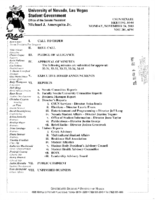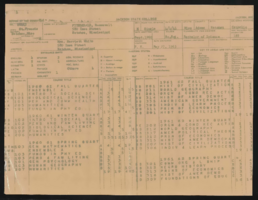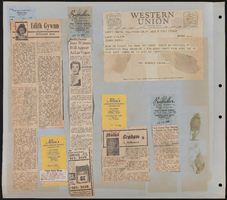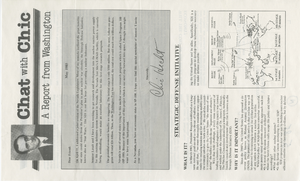Search the Special Collections and Archives Portal
Search Results

Jimmy Lee oral history interview: transcript
Date
Archival Collection
Description
Oral history interview with Jimmy Lee conducted by Vanessa Concepcion, Kristel Peralta, and Stefani Evans on May 25, 2021 for Reflections: The Las Vegas Asian American and Pacific Islander Oral History Project. Jimmy shares his family's history as entertainers and producers in Korea and their migration to the United States when Jimmy was six years old. He talks about their move to Durham, North Carolina and their relocation to Las Vegas, his education, and his current business, mentorship, and philanthropic pursuits. Subjects discussed include: Arirang Sisters; Jo Mackey Sixth Grade Center; Nevada's tax structure; Commercial Center.
Text

Transcript of interview with Paul Senzaki, Alan Hess, and Charlie White III by Stefani Evans and Claytee White, September 9, 2016
Date
Archival Collection
Description
Architect Paul Senzaki, and artist-illustrator Charlie White III recall their experiences of working in Las Vegas: Paul on Treasure Island, The Palms, Fremont Street Experience, and World Market Center and Charlie on Treasure Island and its successor, TI; New York New York. Architectural historian Alan Hess, who is an expert on Las Vegas architecture, offers historical context and asks pertinent questions. While this interview touches on several iconic Las Vegas buildings, the conversation mostly details why and how Steve Wynn's Treasure Island involved the labors of artists, illustrators, art directors, and designers of stage and screen as well as the those of architects, contractors, planners, and subcontractors.
Text

Transcript of interview with Georgie Clark by Steven E. Pilgram, March 2, 1980
Date
Archival Collection
Description
On March 2, 1980, Steven E. Pilgram interviewed river runner, Georgie Clark (born on November 13, 1910 in Chicago, Illinois) at Sambo’s Coffee Shop in Las Vegas, Nevada. This interview is an in-depth discussion about the Colorado River area, including changes, and new rules and regulations. Georgie also recalls working as a real estate agent and as a ferry command, civil servant in World War II.
Text

Meeting minutes for Consolidated Student Senate, University of Nevada, Las Vegas, November 24, 2004
Date
Archival Collection
Description
Text

Roosevelt Fitzgerald curriculum vitae, diplomas, and college transcripts
Date
Archival Collection
Description
From the Roosevelt Fitzgerald Professional Papers (MS-01082) -- Personal and professional papers file. (Transcripts less than 75 years old are restricted.)
Text

Casiano Corpus Jr. oral history interview: transcript
Date
Archival Collection
Description
Oral history interview with Casiano Corpus Jr. conducted by Cecilia Winchell and Stefani Evans on February 14, 2023 for the Reflections: the Las Vegas Asian American and Pacific Islander Oral History Project. In this interview, Corpus Jr. details a difficult childhood in the Philippines, where society is highly socioeconomically stratified. He recalls his parents working a number of jobs to support their large family, and as soon as he finished his primary schooling, he also started working in construction. When his father was finally petitioned by his uncle to move to the United States, Corpus was at first reluctant to go, since he had a familiar life in the Philippines, but has come to love the United States and the life he created for himself. Immediately after moving to the United States, their family landed in Las Vegas, Nevada, and Corpus began working a number of jobs. He started out as a busboy at a Chinese restaurant before deciding that he wanted to work in a casino and moved to Union Plaza. His current job is as a porter at Palace Station, where he has been for the past 31 years. He has also been working to unionize Palace Station and Station casinos with the Culinary Union for the past twelve years. He talks about the hunger strike he organized, why he organizes with no fear, and what he hopes to see out of his efforts throughout the interview.
Text




